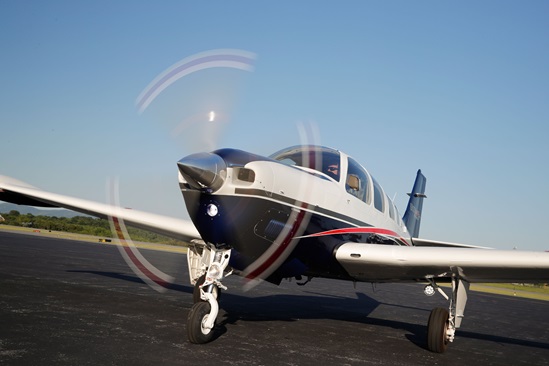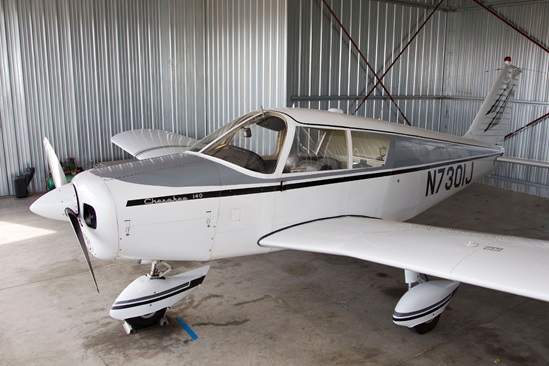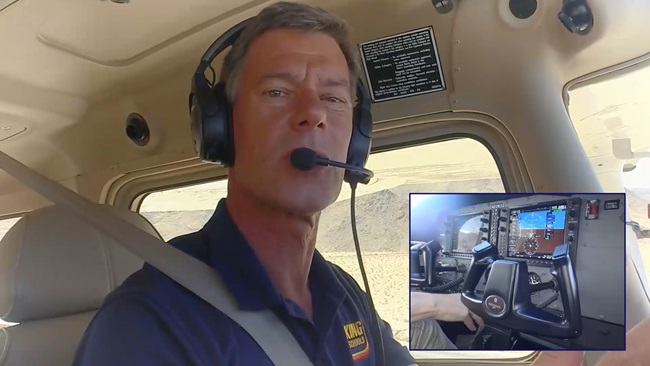| ||||
| | FT News | Inside AOPA | TRAINING PRODUCTS | FINAL EXAM | |||
TRAINING TIPsCarb heat technique
Flight training operations requiring multiple power adjustments or sustained flight at low power settings make training aircraft especially susceptible to carb icing, as discussed in the Aug. 23, 2002, Training Tip. If you suspect carb icing because of a gradual power loss or engine roughness, act promptly and aggressively to eliminate it. In most aircraft equipped with carbureted engines, that means applying full carb heat until normal operation has been restored.
If carb icing was present, chances are that the engine’s response to your actions will confirm your suspicions in dramatic fashion. “The first time you experience carb ice can be startling, since application of full carb heat—as recommended—will likely cause brief coughing and choking in the engine as the ice in the carburetor melts and is ingested by the engine,” explains the AOPA Air Safety Foundation’s Safety Advisor Engine Operations. Then engine operation should become smooth, and the power setting you were maintaining before the icing should resume—so let the carb heat do its work.
There are preventive steps you can take when cruising toward your destination on a day when carb icing conditions prevail. “When icing conditions exist, apply carburetor heat often at your cruise throttle setting. Never use partial carburetor heat unless the aircraft is equipped with a carburetor temperature gauge, ice light, or similar instrumentation. Partial heat can possibly make matters worse, unless you know exact carburetor temperatures,” advises the comprehensive discussion of carb ice in the AOPA Online Pilot Information Center. “Remember, full heat or nothing. When below the green band on the rpm or MP gauge, apply carburetor heat. It is good practice to use it on any descent where you have reduced power.”
Proper use of carb heat is safety in its simplest and most effective form. YOUR PARTNER IN TRAININGMore than once a day, air traffic controllers help a pilot by performing a "flight assist." Download the AOPA Air Safety Foundation's Say Intentions: When You Need ATC's Help Safety Advisor to learn what air traffic control can and can't do to help pilots in distress. For the most effective use of all available services, you need to know how the system works.
Did you know that student pilots who join AOPA are three times more likely to complete their flight training? Membership includes unlimited access to aviation information by phone (800/USA-AOPA, weekdays from 8:30 a.m. to 6 p.m. Eastern time) or from AOPA Flight Training Online or AOPA Online. If you're not already a member, join today and get the pilot's edge. Login information is available online.
FLIGHT TRAINING NEWSVirtual friends will meet, fly cross-countryRandy Lewis and his pal Kendall O’Brien have been virtual friends for four years, sharing a love of aviation and flying together using Microsoft Flight Simulator’s multiplayer online function. This year, they’ll meet for the first time. What’s more, they’ll fly from O’Brien’s home in Murrieta, Calif., in a Cessna 150 to Lewis’s home state of Wisconsin, where they plan to take in EAA AirVenture. Read more>> Explore vertical terrain with new safety quizMountain flying provides adventures—and challenges—that most flatlanders will never know. Learn about the unique risks of unforgiving terrain, tricky mountain weather, and high density altitude in " Mountain Flying," the latest safety quiz from the AOPA Air Safety Foundation. The quiz puts you amid the peaks with dramatic flight simulator footage, photos, and other interactive graphics. Florida flight school offers sport pilot trainingIsland Air Express, in Panama City, Fla., recently announced that it is offering sport pilot flight instruction. Island Air Express also provides private, instrument, commercial, CFI and CFII, CFI-MEI and MEII, and airline transport pilot instruction, as well as accelerated programs for the private pilot certificate and instrument rating. Boston helicopter school to open New York locationNorth Andover Flight Academy, in Boston, Mass., plans to open a satellite location and FBO at Maxson Airfield in Alexandria Bay, N.Y. The school utilizes Robinson R22s and R44s and also provides fixed-wing flight training and tailwheel transition training. Tentative plans call for maintenance services and air tours to be available at Maxson Airfield, located in the Thousand Lakes region of northern New York, according to the Watertown Daily Times . Inside AOPADon't miss out on EAA AirventurePlanning to attend EAA AirVenture 2009 in Oshkosh, Wis., July 27 through Aug. 2? Stop by AOPA’s Big Yellow Tent to meet AOPA President Craig Fuller, inspect AOPA's 2009 Sweepstakes Let's Go Flying Cirrus SR22, and learn more about AOPA’s GA Serves America campaign. We'll see you at the world's largest GA show! Know before you go with updated airspace courseAre you struggling to understand airspace issues and where you can and cannot go? A thorough understanding of airspace in your path is absolutely necessary for today’s pilot. Before you take to the sky, check out the newly updated Know Before You Go: Navigating Today's Airspace online course and related Safety Advisor from the AOPA Air Safety Foundation. Revised sections address restricted airspace, temporary flight restrictions, and the new special flight rules area surrounding the nation's capital. AOPA’s sweeps airplane gets new airbag seatbeltsThe padded, snug-fitting shoulder straps in the front seats of AOPA’s 2009 Sweepstakes Let’s Go Flying SR22 contain a hidden, potentially lifesaving technology: airbags. Read more >> Do your title search with AOPA Title Services If you’ve decided now is the time to buy an aircraft, work with AOPA Title Services, provided by AIC Title. You can order your title search online and help ensure a smooth transition to aircraft ownership. Read more >> TRAINING PRODUCTSQref moves into aircraft checklistsQref Media, manufacturer of avionics checklists, has expanded its product line to include checklists for popular aircraft models. Twenty-three models are available for Cessna, Cirrus, Diamond, and Piper aircraft, with new models to be added each week. They are available in two formats: the compact, multi-page “Q’Book,” and the single-page, double-sided “Q’Card.” Both styles measure approximately 4.5 inches by 8 inches and feature large type and a full-color format. Prices start at $12.95 for Q’Cards and $19.95 for Q’Books. Order online from the Web site, or call 877/660-7733.
Note: Products listed have not been evaluated by ePilot editors unless otherwise noted. AOPA assumes no responsibility for products or services listed or for claims or actions by manufacturers or vendors. FINAL EXAMQuestion: I recently moved to a new address and, following the regulations, notified the FAA of my address change within 30 days. I have not received any response from the FAA. Am I still allowed to use my student pilot certificate even though it has my old address on it?
Answer: You are permitted to use your student pilot certificate even though it does not contain your current address. The FAA does not mail out new pilot certificates every time a pilot moves. Instead, the address change is updated in the FAA records and in the airman database. You can verify that the FAA has your current address by viewing your listing in the airman database.
Got a question for our technical services staff? E-mail [email protected] or call the Pilot Information Center, 800/872-2672. Don't forget the online archive of "Final Exam" questions and answers, searchable by keyword or topic. what's new onlineThis July 4, many of your fellow pilots around the nation participated in the association’s Freedom to Fly campaign. They shared that freedom by taking aloft friends, family members, and others. See our map to look at the flights that took place. Picture Perfect
AVIATION EVENTS & WEATHER To submit an event or to search all events in the calendar, visit AOPA Online. For airport details, including FBO fuel prices, see AOPA's Airport Directory Online. Flight Instructor Refresher ClinicsThe next AOPA Air Safety Foundation Flight Instructor Refresher Clinics are scheduled in Jacksonville, Fla., and Memphis, Tenn., July 18 and 19; Pittsburgh, Pa., July 25 and 26; Costa Mesa, Calif., Atlanta, Ga., and Champaign, Ill., Aug. 15 and 16. For a complete schedule, see AOPA Online.
Can't make it in person? Sign up for the CFI Refresher Online. AOPA Air Safety Foundation Safety SeminarsAOPA Air Safety Foundation Safety Seminars are scheduled in Oshkosh, Wis., July 29, 30, and 31; Germantown, Tenn., Aug. 31; Nashville, Tenn., Sept. 1; Maryville, Tenn., Sept. 3. Topics vary—for details and a complete schedule, see AOPA Online. | Got news? Contact ePilot. Having difficulty using this service? Visit the ePilot Frequently Asked Questions now at AOPA Online or write to [email protected]. |
| Member Tools : Send feedback | Update member profile | Change email address | Unsubscribe | ePilot Archive Editorial Team : ePilot Flight Training Editor : Jill Tallman | ePilot Editor: Alyssa Miller | Contributor: Alton Marsh |

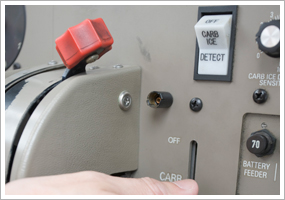 Warmer temperatures and high humidity create many challenges for pilots, including reduced aircraft performance, thunderstorm development, and rapid fog formation when temperature-dewpoint spreads narrow. These are also the conditions that elevate the risk of aircraft with carbureted engines developing ice in the carburetor throat, with potential for power loss or even engine stoppage. Do you use correct technique to minimize the risk? Can you recognize the signs of carburetor icing’s onset?
Warmer temperatures and high humidity create many challenges for pilots, including reduced aircraft performance, thunderstorm development, and rapid fog formation when temperature-dewpoint spreads narrow. These are also the conditions that elevate the risk of aircraft with carbureted engines developing ice in the carburetor throat, with potential for power loss or even engine stoppage. Do you use correct technique to minimize the risk? Can you recognize the signs of carburetor icing’s onset?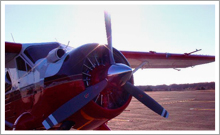 Pilots love to take photos, and they love to share them with other pilots. Now you can upload your flying photos to our
Pilots love to take photos, and they love to share them with other pilots. Now you can upload your flying photos to our 